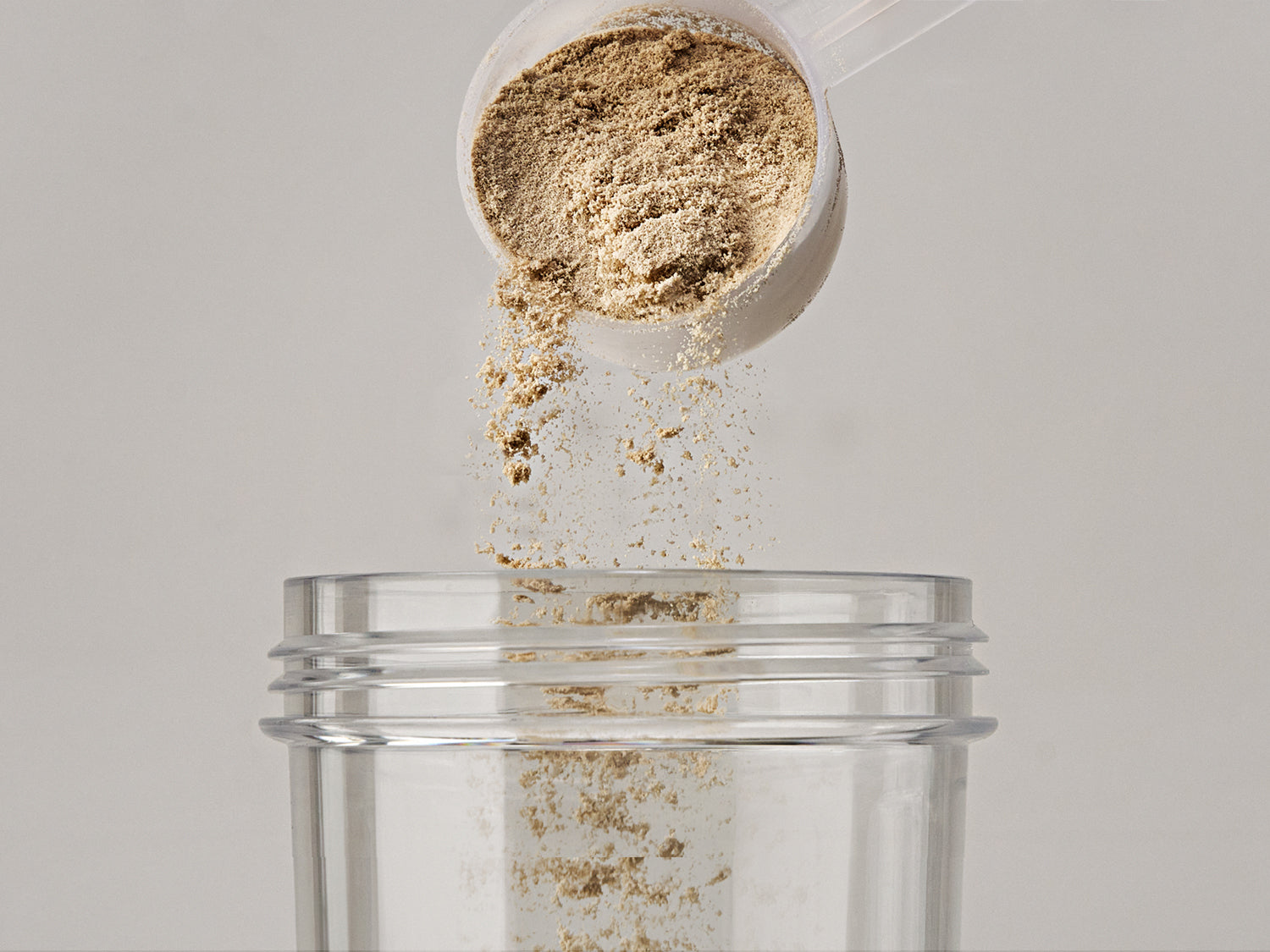If you are someone who trains regularly and loves a high-quality cup of coffee, then you might be considering mixing the two.
Creatine is one of the most well-known and studied supplements on the planet and is one of the most effective for supporting muscle growth and high-intensity exercise performance. (1)
Coffee is another staple in many cultures for the taste and experience of drinking it, but also because of the caffeine content within it.
Caffeine consumption is great way to boost your energy, alertness, and mental focus for any task that you encounter. (2)
With your daily workout being one of them.
Combining the two might seem like a no-brainer to maximize your training performance and gains.
But the question remains whether the combination of these two substances, creatine and coffee, is truly beneficial or if there are potential drawbacks.
Below we’ll outline the details of combining creatine with coffee and answer whether or not doing so is right for you and your training goals.
Creatine and Coffee Basics
Creatine is a naturally occurring compound within your muscle tissue that can also be found in meat and fish. (1)
It plays an important role in producing adenosine triphosphate (ATP) which is the energy “currency” for every activity that you perform.
For high-intensity activities, creatine helps to rapidly replenish ATP so that you can perform more work at a faster rate such as lifting heavy weights, sprinting, or jumping.
By supplementing with creatine, you can maximize your phosphocreatine stores within the muscle to provide ample amounts for ATP regeneration.
This leads to more work and more intensity, which leads to more gains in strength, muscle and performance over time.
Creatine is one of the most widely used supplements because of how effective it is for athletes, bodybuilders, and other high-intensity sports.
Creatine: What it is and How it Works?
Creatine is a naturally occurring compound within your muscle tissue that can also be found in meat and fish. (1)
It plays an important role in producing adenosine triphosphate (ATP) which is the energy “currency” for every activity that you perform.
For high-intensity activities, creatine helps to rapidly replenish ATP so that you can perform more work at a faster rate such as lifting heavy weights, sprinting, or jumping.
By supplementing with creatine, you can maximize your phosphocreatine stores within the muscle to provide ample amounts for ATP regeneration.
This leads to more work and more intensity, which leads to more gains in strength, muscle and performance over time.
Creatine is one of the most widely used supplements because of how effective it is for athletes, bodybuilders, and other high-intensity sports.
Caffeine: What It Is and How It Works?
Caffeine is found in coffee and is responsible for the increase in mental alertness and energy experienced when drinking it. (2)
In certain amounts, caffeine is also considered an ergogenic aid because of its effect on the nervous system, energy levels, and substrate utilization.
Caffeine works by blocking adenosine receptors which typically promote feelings of fatigue.
As a result, taking enough caffeine before exercise can reduce your perception of fatigue and allow you to exercise harder for longer.
Taking 3-6mg/kg of body weight of caffeine about 30 minutes before exercise has been shown to increase endurance, reaction times, and strength levels. (2)
These effects can last for several hours, depending on how sensitive to caffeine you are and how much you consume.
This makes caffeine particularly powerful for athletes or lifters engaged in long competitions or training sessions.
Why Would You Combine Creatine and Coffee?
Creatine and caffeine are individually known for their benefits in enhancing exercise performance.
Creatine helps support high-intensity efforts while caffeine increases energy levels, alertness, and focus.
By combining these two supplements into one pre-workout drink, you are able to simplify your pre-workout supplementation and optimally prep your body to train.
It also can act as a convenient way to achieve your total daily creatine amount conveniently.
Especially if you are going to consume coffee anyway.
For example, if you are in the middle of a creatine loading phase and require 20-25g of creatine per day, adding a serving to your morning coffee is an easy combination. (1)
But in order to ensure that the benefits of these two ergogenic aids are not impacted it's important to understand how or if they will interact with each other.
The Benefits of Adding Creatine to Coffee
1. Creatine Consumption Compliance
The most obvious benefit of adding a serving of creatine to your coffee is maximizing convenience.
The effectiveness of creatine supplementation depends on how well your muscles are saturated with it. (1)
During the loading phase, it is imperative to consume 20-25g per day of creatine to reach full saturation levels.
By creating a routine of adding 5-10g to our morning coffee, you drastically increase the likelihood that you consume the full daily amount.
For those who routinely forget to take their supplements or who don't want to have multiple liquids splashing around in their stomach this can be a game changer.
2. Performance Enhancement
The next reason you may want to combine creatine and coffee is for performance-enhancing effects.
Prior to your training, consuming ergogenic aids is a reliable way to give your body a boost in performance.
As we have already established, creatine provides increased substrate for high-intensity activities such as heavy lifting, sprinting, and jumping.
Coffee and the caffeine found in it can increase your alertness, energy, decrease your perception of effort, and optimize your substrate utilization.
Caffeine also helps to preserve muscle glycogen, which is the primary fuel source for the body. (2)
By combining these two substances, you can get the “best of both worlds” with regards to increased energy and motion, resistance to fatigue, optimizing your body's fueling and giving you what you need to train explosively.
3. No Negative Interactions
The first concern one might have when combining two supplements is the interference effect they may have on each other.
The last thing you want is to take a supplement for its benefits, and another supplement blocks its effectiveness.
But fortunately, research shows that taking creatine and caffeine together does not seem to result in a significant negative interaction or impair either of their effectiveness. (3)
A systematic review in 2022 demonstrated that creatine and caffeine could be combined, and the co-ingestion of the two did not hinder the performance-enhancing effects of either of them.
This means that you can expect the same results combining the two compounds as you would if you took them individually.
The Drawbacks of Creatine in Coffee
1. Gastrointestinal Distress
Creatine and coffee are both known to potentially cause gastrointestinal issues in some people. (1,2)
Unfortunately, these issues may become compounded when they are combined.
Additionally, creatine can cause feelings of bloating, even though the increase in intracellular water is part of the performance boosting process.
Creatine is also associated with stomach cramps and diarrhea when taken in high doses, such as during the loading phases.
Caffeine causes digestive issues when taken in excess or in individuals who are sensitive to it, such as increased motility and diarrhea.
When taken together, the stomach's reaction to coffee's acidity and the osmotic properties of creatine can increase gastric symptoms.
However, you can take steps to reduce these occurrences by starting with smaller doses of creatine and coffee and gradually increasing them over time.
2. Heat Stability
Another consideration to be made when consuming creatine and coffee together is creatine's sensitivity to heat.
At high temperatures, creatine can break down into creatinine, which is a byproduct and not effective for performance enhancement. (4)
Since coffee is often consumed at high temperatures, this could pose an issue if you want to combine it.
To avoid this and maintain creatine's effectiveness, you may want to consider allowing your coffee to cool to a lukewarm or room temperature before adding it.
You also may want to switch from a hot coffee to an iced coffee to avoid warm temperatures altogether.
3. Individual Sensitivity and Health Considerations
Both creatine and caffeine are considered safe to consume in appropriate dosages.
Creatine has been shown to be safe to consume up to 25g per day in healthy individuals, and the upper limit for caffeine is roughly 400mg per day. (5)
If you are someone who is sensitive to caffeine, you may develop symptoms such as jitters, anxiety, or restlessness.
If you exceed the recommended upper limit, you may also develop these symptoms despite our sensitivity.
The issue with combining creatine and coffee is that a single cup of coffee (8 ounces) will contain about 100mg of caffeine.
Coffee cup sizes can range between eight and twenty-four ounces, so with a large coffee, you are approaching the recommended upper limit set forth by the FDA.
Then, if you consider that during the loading phase you’ll likely need 2+ servings of creatine per day, it can be easy to consume too much caffeine.
To minimize this, you may consider sticking to smaller coffee sizes or only mixing your creatine with your morning coffee and choosing another liquid for a PM serving.
If you are unsure about how you will react to the combination, simply start with smaller servings or use a combination of caffeinated and decaffeinated coffee throughout the day.
Types of Creatine to Use in Your Coffee
If you are going to combine your creatine in your coffee, the type of creatine you choose can affect how well it dissolves, tastes, and affects the body.
There are a few options when it comes to creatine, so understanding the differences can help you make an informed choice.
1. Creatine Monohydrate
Creatine Monohydrate is the most studied and widely used form of creatine.
It’s very affordable and effective, and has shown to be a quality performance enhancer for several years at this point.
If you want to maximize your performance gains and minimize your spending, then creatine monohydrate is your best bet.
One of the best options available on the market today is MuscleTech’s 100% Creatine. It provides 50 servings of 5g pure creatine monohydrate.
Giving you only what you need to combine your creatine in coffee and be on your way to making gains.
2. Micronized Creatine
Another option is micronized creatine, which is essentially creatine monohydrate broken down into smaller particles.
Since the particles are smaller, it allows for easier dissolving in water or coffee so you’re less likely to have clumps of sediment as you drink it.
If you find that your regular creatine monohydrate is hard on your stomach or you consistently have undissolved particles in your coffee give micronized creatine a try.
It will typically come with a slightly higher price tag but is typically a better experience supplementing with it.
To give micronized creatine a shot, check out MuscleTech’s Platinum Creatine Monohydrate which provides 80 servings of 5g micronized creatine monohydrate.
3. Creatine HCL
Creatine hydrochloride is a potentially more soluble form of creatine and may have have fewer side effects for some people. (6)
But, unlike monohydrate, there is less research on creatine HCL and ma be less effective on performance compared to monohydrate. (6)
If you just cant seem to shake unwanted side effects of creatine supplementation than HCL could be an option for you.
However if you want to ensure you are stain evidence based on what has been proven to work then monohydrate is still your choice.
Timing Considerations for Creatine and Coffee Consumption
With any sports supplement, when you consume it will have an effect on how effective it is.
So, understanding the timing considerations for both creatine and caffeine is important especially if you are considering combining them.
Creatine Timing
Fortunately, creatine does not require specific timing.
Its mechanism of action is based on a buildup or saturation of it within the muscles to be used for energy production. (1)
You are not looking for an immediate effect like you would with caffeine.
While you can get into a routine of consuming creatine prior to your workout to potentially “top off” your creatine stores it is not absolutely necessary.
As long as you consume the necessary serving for the day you are on track.
Caffeine Timing
Unlike creatine, caffeine has timing considerations to be aware of.
For starters, caffeine will typically take about 30 minutes to begin working after you consume it. (2)
At this time you will start to feel more alert, focused and energized in addition to feeling it’s endurance effects.
Thus, optimal timing of caffeine if you want a performance increasing effect will be about 30 minutes before training.
Something else to consider is caffeine’s half life of 4-6 hours.
This means that consuming caffeine too late in the day ma give you a boost for your workout but negatively impact your sleep.
Ideally you would refrain from consuming caffeine close to bedtime so that crucial recovery time isn’t effected.
Wrapping up on Creatine in Coffee
Mixing your creatine in coffee might be just what you need to simplify your supplement routine, increase consistency and enhance your performance in the gym.
But, it’s important to weight the pros and cons based on doing so and your specific needs before doing so.
Just as is the case with any supplement stack.
Fortunately both creatine and caffeine are both highly effect and safe to consume with only minor side effects when taken as recommended.
So use this article as a guide and evaluate which combination is right for whether that’s using hot or iced coffee, morning or afternoon creatine and coffee combinations or opting for regular, micronized or HCL creatine.
As always if you are unsure how your body will respond to the combination, consult with a healthcare professional and then get into the gym to start making gains!
References:
Kreider, R. B., Kalman, D. S., Antonio, J., Ziegenfuss, T. N., Wildman, R., Collins, R., Candow, D. G., Kleiner, S. M., Almada, A. L., & Lopez, H. L. (2017). International Society of Sports Nutrition position stand: safety and efficacy of creatine supplementation in exercise, sport, and medicine. Journal of the International Society of Sports Nutrition, 14, 18. https://doi.org/10.1186/s12970-017-0173-z
Guest, N. S., VanDusseldorp, T. A., Nelson, M. T., Grgic, J., Schoenfeld, B. J., Jenkins, N. D. M., Arent, S. M., Antonio, J., Stout, J. R., Trexler, E. T., Smith-Ryan, A. E., Goldstein, E. R., Kalman, D. S., & Campbell, B. I. (2021). International society of sports nutrition position stand: caffeine and exercise performance. Journal of the International Society of Sports Nutrition, 18(1), 1. https://doi.org/10.1186/s12970-020-00383-4
Vanakoski, J., Kosunen, V., Meririnne, E., & Seppälä, T. (1998). Creatine and caffeine in anaerobic and aerobic exercise: effects on physical performance and pharmacokinetic considerations. International journal of clinical pharmacology and therapeutics, 36(5), 258–262. https://pubmed.ncbi.nlm.nih.gov/9629989/
Antonio, J., Candow, D. G., Forbes, S. C., Gualano, B., Jagim, A. R., Kreider, R. B., Rawson, E. S., Smith-Ryan, A. E., VanDusseldorp, T. A., Willoughby, D. S., & Ziegenfuss, T. N. (2021). Common questions and misconceptions about creatine supplementation: what does the scientific evidence really show?. Journal of the International Society of Sports Nutrition, 18(1), 13. https://doi.org/10.1186/s12970-021-00412-w
U.S. Food and Drug Administration. (2018, December 12). Spilling the beans: How much caffeine is too much? https://www.fda.gov/consumers/consumer-updates/spilling-beans-how-much-caffeine-too-much
Eghbali, E., Arazi, H., & Suzuki, K. (2024). Supplementing With Which Form of Creatine (Hydrochloride or Monohydrate) Alongside Resistance Training Can Have More Impacts on Anabolic/Catabolic Hormones, Strength and Body Composition?. Physiological research, 73(5), 739–753. https://doi.org/10.33549/physiolres.935323




